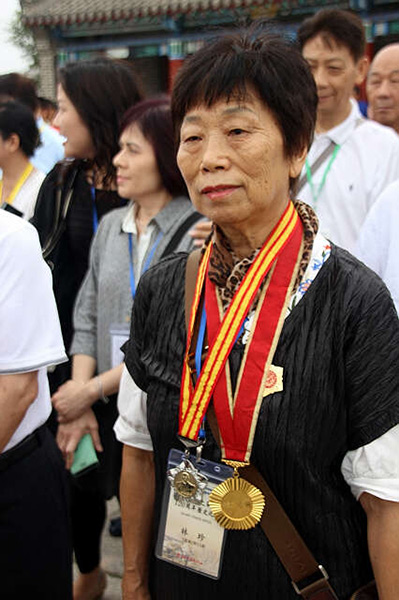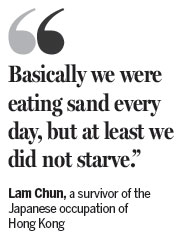Hong Kong recalls the darkest days of war
By Frannie Guan in Hong Kong (China Daily) Updated: 2015-08-28 07:41
 |
|
Lam Chun joined the Hong Kong Independent Battalion of the Dongjiang Column. Photo Provided to China Daily |
Always worried
Ho saw people lining up beside the sewer outlet of a Japanese restaurant near her home, each holding a sieve and waiting to catch waste that poured out into the sewer.
Each time the food waste was flushed, they rushed to the spout to collect what they could. "They made meals with the rice sifted from the waste," Ho said.
Yau Yat, a senior lecturer at Lingnan Institute of Further Education, has interviewed dozens of survivors of Hong Kong's occupation. People living in urban areas suffered more than villagers in the New Territories, he said.
"Villagers could grow some food, but people in the city were always worried about where their next meal might come from," Yau said.
Some villagers swapped food for other necessities with people from the city. Even villagers in remote areas would be harassed by the Japanese. Chow, from Lingnan University, said he had heard similar accounts during his research.
Leung Sau-lin, now 83, who lived in Mong Kok during the occupation, told Chow she had seen villagers buying secondhand clothes on the streets with money earned from selling homegrown crops to people living in urban areas.
Secondhand clothes appeared in the markets in Wan Chai, Yau Ma Tei and Cheung Sha Wan during the occupation. Some vendors sold their own clothes and clothes of their family members who had died. Ho said instances of selling clothes removed from dead bodies lying on the streets were not uncommon.
Chow said that during wartime survival became the priority, and people had to lower their standards and try their best to overcome the difficulties and challenges facing them. They became increasingly enterprising as a result.
In the late 1930s, especially after the occupation of Guangdong province, nearly half a million refugees fled to Hong Kong, swelling the population to 1.6 million by 1941.
The Japanese army concluded that the city lacked the resources to sustain such a large population and began driving those from China back to their hometowns. A commission formed to oversee this offered free rice and transportation across the border.
People whose hometowns could only be reached by foot walked for days, carrying their possessions in two buckets suspended from their shoulders, Ho recalled.
"Some were really miserable because there was a high chance that bandits would rob them of their belongings ... many starved to death before they could step outside Hong Kong."
When the Japanese surrendered in 1945, Hong Kong's population had fallen to 600,000.

Forgotten too soon
Chow said the Japanese occupation of Hong Kong, which lasted three years and eight months, put every family in the city under great stress. He said the city's younger generation, after learning the history of the struggle for survival, should draw a lesson from those dark days.
But Yau said young people in Hong Kong show little regard for this time in history. "They seem they are reading about the history of other places, not the place where they live."
Yau said textbooks portray Hong Kong as one of thousands of battlefields spread over a vast area. Students learn of the failed last stand of the British against the invaders, but seldom learn of the sacrifices made by the people of Hong Kong.
"Young people should learn the complete history of Hong Kong, not only about its economic takeoff in the 1960s as a British colony, but also about its darkest and most miserable period," Yau added.
frannie@chinadailyhk.com




